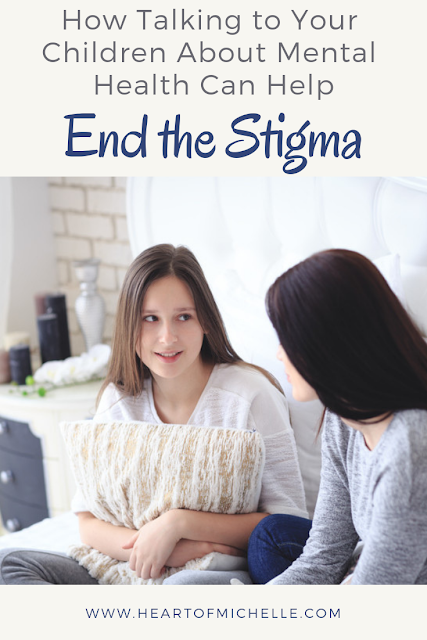Mental health is a topic that affects every human on earth. Talking with kids de-stigmatizes the topic and saves lives!

These are words that often are brushed under the rug. People fear talking about them publicly because there is still a stigma surrounding mental illness.
But here's the thing: talking about mental health with our children can help end the stigma. Nothing else is stronger than letting our children know that they, or those they know, with mental illness should not live in fear.
{This post may contain affiliate links.}
Everyone has mental health.
If I told you 1 in 4 people has physical health issues, what would your response be?It's silly to think only 1 out of 4 humans suffers with physical illness, right? Right. Whether it's something common to us all, such as a cold, or something more serious like cancer, everyone has physical health issues at some point, to one degree or another.
The same applies to mental health. Everyone struggles with it, whether it's stress from a job or marriage, or anxiety about final exams, or something more serious, like bipolar or borderline personality disorder, everyone has mental health, and we need to take care of it just as we do our physical health.
Help your children understand the prevalence of mental illness.
If your children are exhibiting signs of depression or other mental illness, the first thing you can do is let them know that it is OK to talk about, and it’s extremely common. In fact, one in four people do have a serious mental illness.They’re in your daughter’s dance class or your spouse’s office. They are your next door neighbor or your best friend. They are you. They are your children.
People with mental illness are everywhere. Talking about how widespread mental illness is will let your child know that they, and those they love, are not alone. (If you are the parent of a child who has a mental illness, you are not alone, either.)
Make sure your kids know they can come to you with their mental health struggles.
Often survivors of those who die by suicide don’t know that the person was depressed or contemplating suicide until it is too late. Having open conversations with your children about depression and other mental illness will let them know that you care and will not judge them. The sooner you know they're hurting, the sooner you can help them.These conversations can be uncomfortable, but they can save lives. That’s worth having the hard talks.
If you suspect your child or someone you care about is contemplating suicide, ask if they have thought about killing themselves. According to the Society for the Prevention of Teen Suicide, talking about suicide will not plant the idea in your child’s head. They are already aware of the option, and talking about their thoughts or fears will actually help in prevention.
Encourage activities and behaviors that improve their mental health.
Playing sports, writing, or going out with friends will not cure a mental illness. However, engaging in positive behaviors and preferred activities can help children develop a feeling of being connected to people who care for them.Knowing that others care about them, and that they belong, can go a long way when their mental illness feels like it is too much to handle.

Talking about mental health with our kids can help end the stigma.
We need to start treating mental illness like any other illness. If someone has diabetes, heart problems, or a broken bone, we don't shut them up or shun them. In fact, we actively seek help in treating the illness or injury. The same thing should apply for matters of the mind.Our kids need to know that we will not negatively judge them based on their mental health.
Make sure your children know that getting help is not only normal and commendable, but it may save their life, or the life of someone they love.
Educating the next generation is key to ending the stigma.
Imagine if all children understood mental health. Not only will it help them in the ways mentioned above - feeling connected; knowing they have people they can talk to; and possibly saving their lives - but the stigma would eventually vanish because we'd raise a generation of humans who would understand the importance of kindness, compassion, and understanding.
Imagine that, and then go to talk to your kids.
If you suffer from depression of any kind, know there is help available to you. If you are contemplating suicide, please call National Suicide Prevention Lifeline at 1-800-273-8255.
Be sure to follow me on Facebook, Instagram, Pinterest, and Twitter, where I share even more information about mental health.
Need more mental health information?


Post a Comment
Join the conversation!